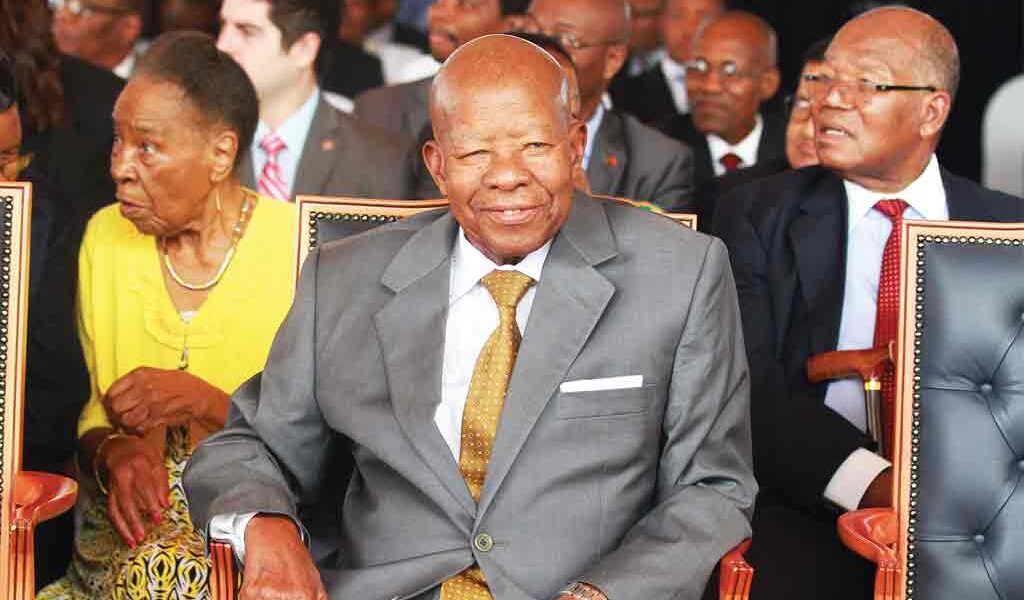- He supported President’s Annual Concert founded during his presidency
- “He was around the period when the industry was born”- DJ sid
- “He used his stature to develop art and literature from Botswana”- Molosi
GOSEGO MOTSUMI
In this edition, Time Out reflects on Sir Ketumile Masire’s role in the growth of the entertainment industry during his 18-year tenure as the country’s second president. As a principal architect of Botswana’s economy, he played a crucial role in the country’s development; in the process earning himself a reputation as a highly competent leader who also contributed to art forms including music, films and literature among others.
The annual President’s Concert is one of the biggest arts initiative that Masire has supported, to promote the arts. With roots from his presidency in the 90s, the initiative was led by Maitisong director David Slatter, and includes a variety of activities like live music performances, dance and folk performances. Just last year, it featured a diverse line up which included Bambino, Sereetsi & the Natives, Leshie Love Song, Spiza Valentino, TNT Entertainment, Mophato Dance Theatre, Sky Blue Dance Hub, Skit Kabomo (Setinkane player) and the legendary Lekofi Sejeso of the eclectic 90s local band Afro Sunshine.
Legendary radio personality and disc jockey, Sidney ‘DJ Sid’ Baitsile says the country’s entertainment industry started to really develop from the late 80’s and by the time Masire left in 1998 it still was not anything to write home about, but it showed positive signs of potential growth. “So, one can say in a nutshell he was around the period when the industry was born,” he said.
Giving an insight into the industry back then Dj Sid said he did not remember attending a live gig by a local band in the 80s. The scene was like today, dominated by foreign acts who include Brenda Fassie among others. A number of legendary SA artists were however based in Botswana including Hugh Masekela who had a studio. Dj Sid left for America for 6 years from 1986 to the end of 1991 and missed six years in which he says he heard that a number of overseas acts made it to Botswana, like Shalamar and UB 40, with the latter being referred to by many as the best show of all-time in the country. Afro Sunshine, Kgwanyape and BDF Band were also big acts then, he explained.
The 90s ushered in a whole new generation of artists, music and Djs with the help of RB2. House music and hip hop dominated the scene in the very early 90s. Kwaito was born towards the mid-90s and took over with the likes of Arthur, Mdu, Trompies, BOP, Brown Sugar, Da Vet Crew and Magents from Botswana. Hip hop also took off. P-Side was born, Third Mind came into being, Ghetto Flava, Lords of The Ghetto. Kwasa kwasa also was born, with likes of Alfredo Mos, Nata Capricon and later Franco. It was during this period that Jamaican ragga icon Shabba Ranks visited Botswana. Big venues started hosting multiple artists, with promoters hosting some memorable shows. The Monate Sukiri music festivals also helped the industry grow. “Myself, Cosmo and Ski dominated the Dj scene for a while before the likes of Fresh and Kinetic P rose to prominence,” he added.
Recently, Masire was interviewed by award winning actor Donald Molosi for his documentary film dubbed, We Are All Blue which has been on rotation on Africa Magic. He also wrote a foreword for Molosi’s book titled Blue, Black and White.
The author and actor told Time Out that Masire attended his plays, enjoyed art and literature and that is partly why he offered to write a foreword for his book to use his stature to develop art and literature from Botswana.
Molosi in his latest documentary wanted to personally thank and honour Masire.“I interviewed him and one of the things he said that stayed with me was when he said, ‘The country does not make people. It is people who make the country.’ I included that moment in the documentary because it sums up President Masire’s belief in active citizenship,” he said, explaining that he was fortunate to have crossed paths with the late former president and honoured that he believed in his capabilities and artistic talents.
Speaking at the inaugural United Congregational Church of Southern Africa (UCCSA) Chaplain’s Concert Dinner in April 2016, Masire after describing music as food for the soul, emphasized the need for the church to work on refining hymns to minister the gospel through soothing melodies as this “could be a powerful tool that could be used to capture lost souls,” advising that producing, recording and publishing quality hymns would go a long way in preaching the gospel.

